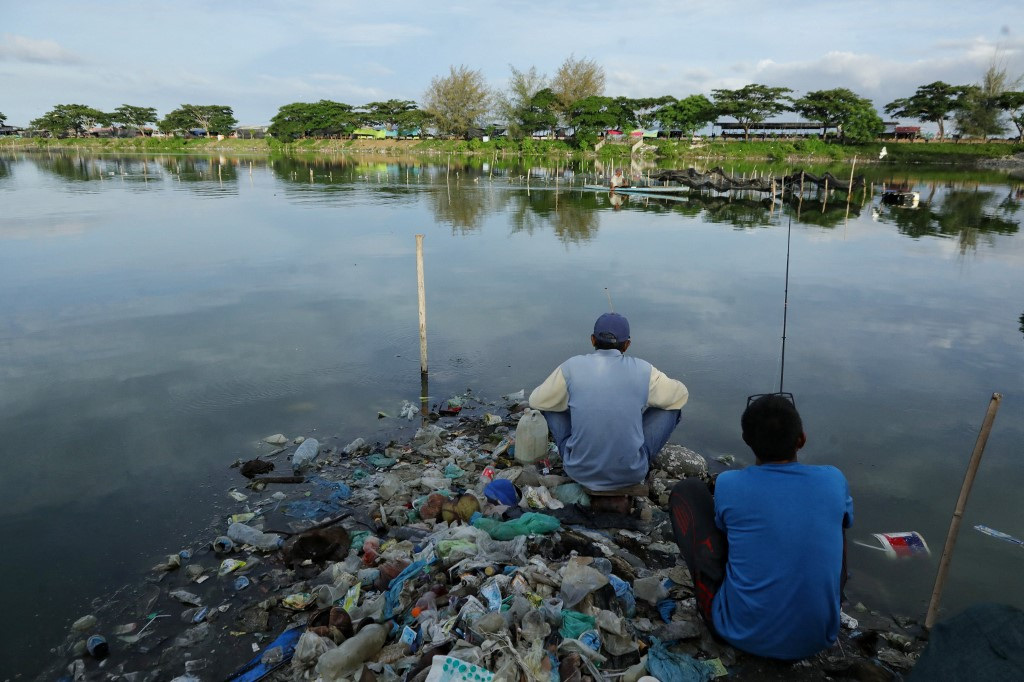Popular Reads
Top Results
Can't find what you're looking for?
View all search resultsPopular Reads
Top Results
Can't find what you're looking for?
View all search resultsGovernment mulls implementing ‘plastic credit’ to reduce waste
Change text size
Gift Premium Articles
to Anyone
T
he government has said that it is mulling whether to implement a plastic credit scheme in a move to address mounting concerns about plastic waste in the country, although an expert has expressed concerns that such a scheme could allow producers to shift their responsibilities to others.
A plastic credit scheme works in a similar way to the carbon credit scheme that was first introduced in the 1997 Kyoto Protocol. Under the plastic credit scheme, a certain quantity of collected and recycled plastic is converted to a unit of “credit” that can be sold to plastic creditors seeking to reduce their plastic footprints.
The funds raised from the credit transaction are then used to finance initiatives to collect and recycle plastic waste following audits by a third party to confirm how much plastic waste has been collected or recycled and how much credit is sold to the buyers.
Environment and Forestry Ministry Director General for Waste Management Rosa Vivien Ratnawati said the government would study whether a plastic credit scheme could be implemented in the country, given that it was still a relatively new concept.
“If a plastic credit scheme is applicable, then we need to know what are the standards and minimal requirements for it, and what kind of regulations would be needed,” said Rosa in a webinar on Thursday.
She pointed out that the government has been requiring producers to limit the use of plastic in their product packaging and resort to more environmentally friendly alternatives as mandated by Environment and Forestry Ministry Regulation No. 75/2019. The regulation aims to reduce waste generation, including plastic waste, by 30 percent by 2030.
The ministerial regulation was in line with a 2017 presidential regulation, which outlined the government’s target to cut waste by 30 percent and marine plastic debris by 70 percent by 2025 relative to a business-as-usual scenario.
At the current pace, Indonesia is on course to produce 70.8 million tons of waste annually by 2025. With the aim of reducing waste by 30 percent by 2025 under the 2017 regulation, the government has also targeted the remaining 70 percent being processed through recycling and other waste-treatment measures.
Without intervention, the plastic waste problem will continue to grow, Rosa said. Of the 68.5 million tons of waste generated in Indonesia last year, about 17 percent was plastic, compared with an 11 percent share of plastic waste from the total waste generated in 2010.
Maggie Lee, the plastic program global markets lead of carbon credit accreditor Verra, said that the implementation of a plastic credit scheme would jump start plastic recycling efforts at the local level.
She said there were mainly two kinds of projects that could receive plastic credit, waste collection and waste recycling, with the credit commonly counted per ton of plastic collected or recycled.
Speaking in the same webinar, Danone Indonesia sustainable development director Karyanto Wibowo said that the plastic credit scheme could help corporations to achieve “plastic neutrality”, a situation where the total amount of plastic manufactured by producers is offset by the purchased credits that financed efforts to collect and recycle an equal amount of plastic from the environment.
However, Karyanto said the scheme should not be the main strategy in the fight against plastic waste, arguing that waste-management efforts such as reducing the use of disposable plastic, substituting new plastics with recyclable materials, as well as improving waste-collection systems, should still be the government’s primary strategy.
“Plastic credit should not be the primary element of a waste-management strategy,” Karyanto said.
A waste expert has expressed his skepticism about whether the plastic credit scheme would help reduce plastic waste in the long run.
Bandung Institute of Technology waste management professor Enri Damanhuri said that at first glance, plastic credits could provide a new financial instrument to deal with mounting plastic waste in the same way that carbon credits do for emissions-reduction efforts.
He, however, expressed concerns that the scheme would allow plastic producers to shift their responsibilities and claim that they had participated in the waste-reduction efforts merely by purchasing the credits.
“I’m concerned that this could allow a business-as-usual attitude,” said Enri.
He also said that there could be a potential imbalance in the value of plastic credits, especially if the buyers originated from developed countries, where waste management could be more expensive than in developing countries, where the credits were purchased.










